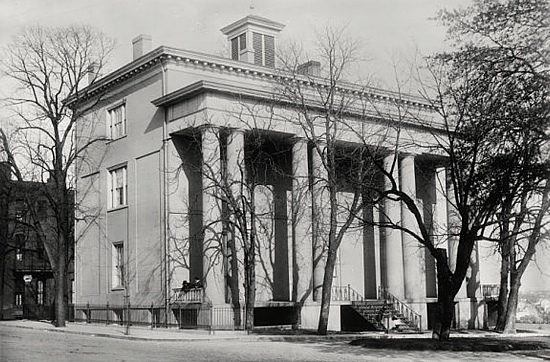Escape from the Confederate White House
Throughout the Civil War, hundreds of thousands of slaves in Confederate states escaped to find freedom in the North.

Throughout the Civil War, hundreds of thousands of slaves in Confederate states escaped to find freedom in the North. Even with networks like the Underground Railroad, attempting an escape was most certainly risking your life. Still, many of those in bondage did make the attempt, especially in a city like Richmond where the trek to cross Union lines at times was only a few miles from the city limits. But even at such a close distance, the odds of a successful escape were slim at best.
In January of 1864, three slaves held by Confederate President Jefferson Davis and his wife Varina escaped to freedom. James Dennison and his wife Betsey had served in the Confederate White House for years as house servants, and Betsey was Varina’s personal maid. One night in early January, they both fled, following the James River until it brought them to Union picket lines. Richmond diarist Mary Boykin Chestnut wrote of the incident in her journal:
The President’s man, Jim, that he believed in as we all believe in our own servants, “our own people,” as we call them, and Betsy, Mrs. Davis’ maid, decamped last night. It is miraculous that they had the fortitude to resist the temptation so long. At Mrs. Davis’ the hired servants have all been birds of passage. First they were seen with gold galore, and then they would fly to the Yankees, and I am sure they had nothing to tell. It is Yankee money wasted.
I do not think it had ever crossed Mrs. Davis’ brain that these two could leave her. She knew, however, that Betsy had eighty dollars in gold and two thousand four hundred dollars in Confederate notes. Mary Boykin Chestnut, 1/9/1864
The northern press was quick to interview Dennison, who made claims that the Davis family felt the Confederate cause was “hopeless” and that they were preparing to flee overseas. He also told a story of an incident where Varina had asked her husband to fix the roof, to which he angrily replied “You will be out of this before another rainstorm,” hinting that their stay there would soon be over. What was true and what was fictional wartime propaganda is something we’ll probably never know the answer to, but for readers it was a fascinating perspective from inside the Confederate president’s home.
The third escape in January took place on January 19th:
Attempt to Burn the President’s House. – About ten o’clock on Tuesday night, some unknown scoundrel attempted to set fire to the President’s Mansion, the attempt being frustrated by a timely discovery by some of the family. A quantity of combustible matter had been placed in one of the basement rooms and then set on fire. The quantity of smoke which issued from the basement room caused an alarm. The fire was extinguished before much damage was done; the incendiary, however, took the occasion to help himself to a quantity of groceries. Richmond Sentinel, 1/22/1864
While the Davises were hosting a reception upstairs, their butler Henry set a fire in the basement. In the ensuing confusion and attempts to put out the fire, he took the opportunity to escape to Union lines. It wasn’t until the smoke cleared (pun intended) that they realized Henry (along with the groceries) had gone missing.
It’s interesting to hear the perspectives of these Civil War-era Richmonders. In her diary, Chestnut assumes a Yankee plot was behind the escape, while Varina herself was taken totally off guard. They were both part of a prevailing attitude in the South that slaves, particularly those who worked in the homes of their wealthy owners, had their needs taken care of and therefore had no reason to run. The idea of a Yankee plot was the only way they could wrap their heads around their decision to flee. They couldn’t understand the power of a chance to find freedom from bondage.
I wasn’t able to find out the fate of the James and Betsy Dennison or Henry after they fled Richmond to freedom. They all made it safely to Union lines, but what happened afterward is not known. Wherever they ended up, I hope they escaped to find a better life.
-
Recommend this
on Facebook -

Report an error
-

Subscribe to our
Weekly Digest




There are no reader comments. Add yours.